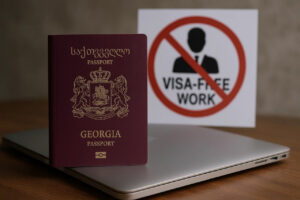
From March 1, 2026, a new system will come into force in Georgia: foreign workers and self-employed persons will need an official work permit.
Previously, the country did not have a full-fledged work permit regime and in most cases allowed foreigners to work without a separate permit, according to industry sources.
According to the business press, there will be a transition period for foreigners already employed in Georgia: they must obtain a permit before January 1, 2027; fines will be imposed on both the employee and the employer for violations (with increased penalties for repeat offenses).
The aim of the reform is to bring order to the labor market, put an end to work on tourist visas, and bring regulation closer to international practice. Additionally, it is reported that the details of the procedure (categories, exceptions, lists of documents) will be specified in subordinate government acts.
In 2024, 135,800 immigrants entered Georgia (–34% y/y), while 121,400 emigrants left the country; 48.2% of immigrants are Georgian citizens, the rest are foreigners. Among foreign citizens, the top countries were Russia, Ukraine, Turkey, India, and Azerbaijan.
Officially, in 2022, 62,300 Russians were registered as immigrants (i.e., they remained to live in the country). In 2023, there were 52,600 Russian citizens among immigrants.
According to media reports and think tanks, in 2025, there will be about 100,000 Russians living in the country (estimates vary widely, taking into account the outflow in 2023). At the same time, only about 20% of them have “tax resident”/official resident status, according to the National Bank of Georgia.
According to the UN, since the start of the full-scale war, approximately 245,000 Ukrainians have passed through Georgia; about 26,600 currently reside in the country (estimate for spring 2025).
Among the largest sources of migration in 2023 are Turkey (≈8,600 immigrants), India (≈8,400), and Belarus (≈3,600); Ukraine provided ≈7,500 immigrants in 2023. These figures show the annual inflow, not the “stock” of permanent residents.
The labor market reform complements earlier changes in migration regulation (e.g., an increase in the minimum property value for a “residence permit by purchase” from $100,000 to $150,000 as of March 1, 2026).
Experts expect that the unification of employment rules will increase the transparency of hiring foreigners and reduce informal employment, but will increase the administrative burden on businesses during the adaptation period.
https://t.me/relocationrs/1390

Finland is the best country in the EU for women in the workplace, a new study has revealed. Personal finance experts Finansvalp analysed Eurostat data on seats held by women in national parliaments, women in senior management positions, and the 2022 median net income by gender in the 27 EU member countries. Each country was given a gender-equality score out of 50 and ranked from worst to best.
Finland topped the study as the best country for gender equality in the workplace. The country ranked above every other destination due to a high percentage of women in senior roles nationwide. Women make up 72.4% of seats in the national government, the highest percentage of any country in the EU. Finland also placed second for the share of women in seats at national parliament with 46%. Despite a high volume of women taking on senior positions in the country, the gender pay gap still seems to be an issue in Finland. The median net income for men in 2022 sat at €27,353, while women earned 6.04% less on average with €25,719.
Portugal fell just short of Finland, ranking second for gender equality in the workplace. In 2022, the median net income in Portugal was higher for women than men, positioning the country as the only EU nation where female workers earn more on average. Women took home a median net income of €11,038, 0.53% more than the median wage of €10,979 for men. While annual earnings propelled Portugal near the top of the study, the country had the sixth lowest share of female executives, with women counting for only 16.9% of executives at Portugal’s largest publicly listed companies.
France claimed third spot on the study of the EU countries with the most gender-equal workplaces. The country rated high for gender equality thanks to a large percentage of women in leadership roles in some of its biggest publicly listed companies. Women made up 46.1% of board members at these major corporations, the highest percentage of any EU country. One of every four executives at the same companies are women (29%), second only behind Lithuania.
Sweden placed fourth on the study for gender equality in the workplace. The country is home to the most gender-equal parliament in the EU. Approximately 46.6% of seats in the national parliament are held by females, more than any other nation. Sweden also has the fourth-highest percentage of female executives at the country’s large public organisations, with women representing 28.6% of all executives.

The Netherlands rounded out the top five EU countries for women in employment. The country ranked high for female representation in the national government (53.6%) and national parliament (29%). While women make up a large proportion of seats at government and parliament level, men still tend to earn more on average in the Netherlands. According to the 2022 median net income, men earn 5.28% more than women in the country.
Belgium is home to the sixth most gender-equal workplaces in the EU. More than half (55%) of the seats in Belgium’s national government are held by women, the second-highest percentage of any nation in the study. The country’s female representation also remains high at parliament level as well, with females taking 42.9% of all seats. Belgium also has the 11th lowest gender pay gap in the EU, with the median net income of men 3.37% higher than women.
Denmark secured seventh place on the study of the best EU countries for women to work. The country ranked high due to having the 8th lowest gender pay gap in the EU (3.03%) and large proportion of women in senior roles across the nation. Precisely 44.1% of seats at Denmark’s national parliament are held by females, with only Sweden and Finland having a higher rate in the EU. The country also has the third-highest rate of female board members at its largest publicly listed companies (41.4%), just below France and Italy.
Spain, Germany, and Lithuania filled out the top 10 EU countries with the most gender-equal workplaces. Spain and Germany rated high for female representation at government and parliament level, while Lithuania claimed 10th place on the study thanks to the highest share of female executives of any EU nation.
Table: The EU countries with the most gender-equal workplaces
Olle Pettersson, finance expert and CEO of Finansvalp, commented on the study: “In the last 20 years, the number of women holding seats at national government and national parliament level in the EU has risen by over 50%, while the share of female board members at the largest publicly listed companies has exploded by 312%.
“If the trend of greater female representation continues in senior positions across the EU, we should hopefully see the gender pay gap reduce, making many countries more inclusive places for women to work.”
The full table of results can be accessed here.
Sources: Eurostat

On April 11, the Prometey group of companies resumed the work of its Kiev office, while its main office in Nikolaev has not stopped working since the beginning of Russia’s invasion of Ukraine, the grain trader’s website reported on Friday.
The owner of the holding, Rafael Goroyan, noted in a message that the Kyiv staff of Prometey is returning to the production process, since now the city is calm and safe.
The grain trader clarified that he still does not have access to 3 thousand hectares in the Snigirevsky district of the Nikolaev region due to the occupation of part of the region by Russian troops, while the total land bank of Prometey is 20 thousand hectares.
In the territory controlled by Ukraine, out of 17 thousand hectares, 10 thousand hectares have already been sown with winter crops, sunflower is being planted in the remaining areas.
“Prometey” recalled that in mid-March, Russian invaders attacked the offices of the production companies “VK Prometey” (Peski village) and Agro Capital Center LLC (AKC, Dobraya Krinitsa village, both – Mykolaiv region), where they destroyed / x and office equipment, documentation, weighing and monitoring systems. Despite the attack, the company has already reopened branches.
GC “Prometey” provides services for the storage, processing and logistics of grain and leguminous crops on the basis of 29 elevators in Mykolaiv, Kirovograd, Kiev, Khmelnytsky, Zaporozhye, Sumy, Odessa, Kherson and Dnepropetrovsk regions.
At the end of 2021, Prometey Group plans to receive $45 million in EBITDA, while in 2020 this figure reached $32.6 million, and in 2019 – $30.5 million.
The founder and owner of Prometey Group of Companies is Rafael Goroyan.

The Planeta Kino cinema chain reopens the cinema at the Appolo shopping center (Dnipro) on Thursday, April 14, in the capital next week, Natalia Baidan, CEO of the chain, told Interfax-Ukraine.
“We work in Lviv and Odessa, tomorrow we will open in the Dnieper. Next week we will open in Kyiv. Until the end of the month, possibly in Sumy. The situation is difficult and not yet predictable with Kharkov,” she said.
The CEO of the network specified that a cinema in the River Mall will first open in the capital.
At the same time, she noted that from the point of view of business, the results of March are unsatisfactory.
“We generate losses. In normal months, our sales were at the level of about UAH 80 million per month, now it is less than UAH 2 million. I am actively negotiating with copyright holders to provide us with new releases. There is a hope that they will appear in May. Then, I hope, the situation will be resolved,” Baidan said.
The Cinema Planet network, which belongs to Triumph Media Group LLC, has nine cinemas in Kyiv, Odessa, Lvov, Kharkiv, Sumy and Dnipro. It is also known about plans to open a new cinema in the Ocean Mall shopping center (Kyiv).
LLC “Triumph Media Group” was established in 2006, the main activity is the demonstration of films.
According to the Unified State Register of Legal Entities and Individual Entrepreneurs, the owner of the enterprise is Moviemax Limited (100%, Cyprus), the ultimate beneficiaries are Dmitry Derkach and Andrey Shpig. The authorized capital is UAH 72.5 million.

Some 85% of 355 business representatives polled by Gradus Research with the support of the Kiev School of Economics (KSE) as part of their study partially or completely suspended the work of their companies due to the war.
“The war has made significant changes in the work of Ukrainian business: about 85% of the business stopped working in partial operation or even stopped work altogether, among which 1% stopped their activities and do not plan to resume, and 35% suspended it, waiting for better times,” the authors of the study said. release on the CSE website.
At the same time, sectoral transformation as one of the ways to save a business from closure turned out to be relevant for 37% of the enterprises that took part in the study – in 21% of cases, a business is in the process of sectoral transformation. At the same time, 16% of respondents have completely or partially transformed, and the same number can potentially join this process.
“The most popular business areas since the beginning of the war have been the retail trade in food and non-food products – in total, up to 24% of the businesses that took part in the study account for these two areas,” the release says.
According to Gradus, 86% of businesses are operating with less workload than before the war, but there are those whose workload has even increased.
“As the difficulties that arise in organizing the work of a business, half of the audience cites a lack of orders. Up to a third of respondents (29%) complain about problems with logistics,” the researchers said.
With regard to government assistance, 37% of respondents, according to the results of the study, are counting on tax holidays.
Other expectations include assistance with organizing logistics, access to cheaper finance, product promotion and keeping key employees from going abroad, military service.
The authors of the study note that the difficult times of business significantly affect the financial support of employees and suppliers – 3-5% of businesses pay relatively large payments, 14-19% make payments at the pre-war level. Other businesses have either reduced the share of payments or stopped altogether – 39% do not pay wages, and 29% do not pay suppliers.
The report clarifies that the survey was conducted by the method of self-completion of the questionnaire in a mobile application in cities with a population of more than 50 thousand people, the sample was 355 respondents.

Polish Ambassador to Ukraine Bartosz Cichocki, Turkish Ambassador to Ukraine Yağmur Ahmet Güldere and Apostolic Nuncio to Ukraine Archbishop Visvaldas Kulbokas continue to work in Kyiv, the Polish Ambassador to Ukraine said.
“There are also a nuncio and a Turkish ambassador,” Cichocki said on Twitter on Wednesday.
So he responded to the media’s suggestion that he was the only Western ambassador who did not leave Kyiv.